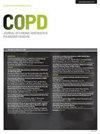Race Adjustment of Pulmonary Function Tests in the Diagnosis and Management of COPD: A Scoping Review
IF 3.1
3区 医学
Q1 Medicine
International Journal of Chronic Obstructive Pulmonary Disease
Pub Date : 2024-04-29
DOI:10.2147/copd.s430249
引用次数: 0
Abstract
Aim: Increasing evidence suggests that the inclusion of self-identified race in clinical decision algorithms may perpetuate longstanding inequities. Until recently, most pulmonary function tests utilized separate reference equations that are race/ethnicity based.Purpose: We assess the magnitude and scope of the available literature on the negative impact of race-based pulmonary function prediction equations on relevant outcomes in African Americans with COPD.
Methods: We performed a scoping review utilizing an English language search on PubMed/Medline, Embase, Scopus, and Web of Science in September 2022 and updated it in December 2023. We searched for publications regarding the effect of race-specific vs race-neutral, race-free, or race-reversed lung function testing algorithms on the diagnosis of COPD and COPD-related physiologic and functional measures. Joanna Briggs Institute (JBI) guidelines were utilized for this scoping review. Eligibility criteria: The search was restricted to adults with COPD. We excluded publications on other lung disorders, non-English language publications, or studies that did not include African Americans. The search identified publications. Ultimately, six peer-reviewed publications and four conference abstracts were selected for this review.
Results: Removal of race from lung function prediction equations often had opposite effects in African Americans and Whites, specifically regarding the severity of lung function impairment. Symptoms and objective findings were better aligned when race-specific reference values were not used. Race-neutral prediction algorithms uniformly resulted in reclassifying severity in the African Americans studied.
Conclusion: The limited literature does not support the use of race-based lung function prediction equations. However, this assertion does not provide guidance for every specific clinical situation. For African Americans with COPD, the use of race-based prediction equations appears to fall short in enhancing diagnostic accuracy, classifying severity of impairment, or predicting subsequent clinical events. We do not have information comparing race-neutral vs race-based algorithms on prediction of progression of COPD. We conclude that the elimination of race-based reference values potentially reduces underestimation of disease severity in African Americans with COPD.
Keywords: lung function tests, lung function prediction equations, African Americans
慢性阻塞性肺疾病诊断和管理中的肺功能测试种族调整:范围界定综述
目的:越来越多的证据表明,在临床决策算法中纳入自我认定的种族可能会使长期存在的不公平现象永久化。目的:我们评估了现有文献中基于种族的肺功能预测方程对患有慢性阻塞性肺病的非裔美国人相关结果的负面影响的程度和范围:我们于 2022 年 9 月利用英文在 PubMed/Medline、Embase、Scopus 和 Web of Science 上进行了一次范围审查,并于 2023 年 12 月进行了更新。我们检索了有关种族特异性与种族中立性、无种族或种族逆转肺功能测试算法对慢性阻塞性肺疾病诊断以及慢性阻塞性肺疾病相关生理和功能指标影响的出版物。乔安娜-布里格斯研究所(Joanna Briggs Institute,JBI)指南被用于此次范围界定审查。资格标准:检索仅限于患有慢性阻塞性肺病的成年人。我们排除了有关其他肺部疾病的出版物、非英语出版物或不包括非裔美国人的研究。搜索确定了出版物。最终,本综述选取了六篇经同行评审的出版物和四篇会议摘要:结果:将种族从肺功能预测方程中剔除,往往会对非裔美国人和白人产生相反的影响,特别是在肺功能受损的严重程度方面。如果不使用特定种族的参考值,症状和客观结果会更加一致。在所研究的非裔美国人中,种族中立的预测算法一致导致了严重程度的重新分类:有限的文献资料不支持使用基于种族的肺功能预测方程。结论:有限的文献资料并不支持使用基于种族的肺功能预测方程,但这一论断并不能为每一种特定的临床情况提供指导。对于患有慢性阻塞性肺病的非裔美国人来说,使用基于种族的预测方程似乎无法提高诊断的准确性、对损伤的严重程度进行分类或预测后续的临床事件。在预测慢性阻塞性肺病的进展方面,我们没有比较种族中立算法和基于种族算法的信息。我们的结论是,取消基于种族的参考值可能会减少对患有慢性阻塞性肺病的非裔美国人疾病严重程度的低估。关键词:肺功能测试;肺功能预测方程;非裔美国人
本文章由计算机程序翻译,如有差异,请以英文原文为准。
求助全文
约1分钟内获得全文
求助全文
来源期刊

International Journal of Chronic Obstructive Pulmonary Disease
RESPIRATORY SYSTEM-
CiteScore
5.10
自引率
10.70%
发文量
372
审稿时长
16 weeks
期刊介绍:
An international, peer-reviewed journal of therapeutics and pharmacology focusing on concise rapid reporting of clinical studies and reviews in COPD. Special focus will be given to the pathophysiological processes underlying the disease, intervention programs, patient focused education, and self management protocols. This journal is directed at specialists and healthcare professionals
 求助内容:
求助内容: 应助结果提醒方式:
应助结果提醒方式:


